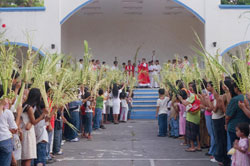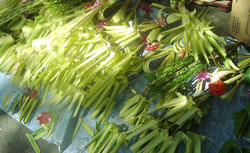|
Palm Sunday of the Lord's Passion (the full name), the
first Sunday of Holy Week within the Lenten Season,
commemorates Jesus' triumphal entry into Jerusalem
preceding his passion. As he entered, the people of
Jerusalem recognized Jesus as their king, saying
"Hosanna to the Son of David; Blessed is he who comes in
the name of the Lord"

Traditionally in the Western Church the Palm Sunday
service begins with the "blessing of the palms," where
the palms used in the procession that follows are
blessed. Then a procession into the church building
follows. If there cannot be a procession from the
outside of the church, a solemn entrance, taking place
entirely within the church, may be done. The hymns and
psalmody are related to Christ's office as King.
Traditionally the Gloria Laus (All Glory Laud and
Honor...), written by Theodulf of Orleans, is sung. Many
times the worship service contains a "preaching of the
passion," where different events in the last days of
Christ are read publicly within the Eucharistic service.
Palm Sunday is also called Fig Sunday, because figs were
traditionally eaten that day, memorializing the fig tree
cursed by Christ after his entry into Jerusalem. In
England Palm Sunday was called Olive or Branch Sunday,
Sallow or Willow, Yew or Blossom Sunday, or Sunday of
the Willow Boughs, named for the local replacements for
the traditional palm branches.

Various customs have developed to celebrate Palm Sunday.
In the Slavic countries, the faithful walked through
their buildings and fields with the blessed palms,
praying and singing ancient hymns. They then laid palm
pieces on each plot of ground, in every barn, building,
and stable, as a petition was made for protection from
weather and disease, and for a blessing upon the produce
and property.
The pilgrim Egeria attests to a Palm Sunday procession
taking place in the Jerusalem Church at the end of the
4th century. In the Gallican Bobbio Missal of the 8th
century we find a reference to blessing of the palms,
which symbolize the victory of Christ. The more
elaborate celebrations of the Middle Ages have been
replaced by simpler services in the Western Church. Many
denominations, including Lutherans, Methodists, and
Presbyterians celebrate Palm Sunday, in addition to
Catholics and Eastern Christians.
|